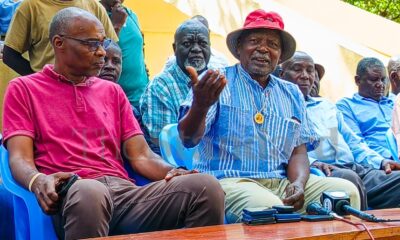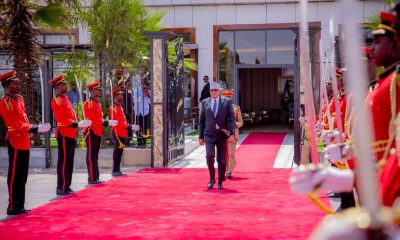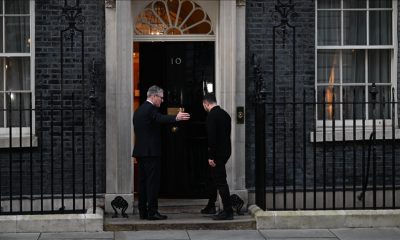Business
Lost Hopes For Brexit As Talks About New ‘Nosediving’ Deal Recommence

Earlier this month, Kenya reached an agreement to continue trading with Britain under preferential terms even after the UK still hold talks on how they will exit from the European Union. The deal that allowed the UK to provide duty-free, quota-free access to Kenyan goods exported to the UK. The two-year deal is set to give the UK government time to work on new trade agreements to replace the current European Union pacts.
Stephen Barclay the UK’s Brexit Secretary traveled to Brussels on Friday, amid growing pessimism on the continent over whether a new withdrawal deal can be agreed. The EU’s chief negotiator, Michel Barnier, told diplomats on Thursday that the UK’s proposed alternative to the Irish backstop was unworkable.
But according to the BBC Brussels reporter Adam Fleming, Stephen’s briefing were relaxed and mostly understated as he would put it, “ the briefing were downbeat.”
According to Downing Street, the progress has been made but there were still significant obstacles to reaching a Brexit deal. The European diplomats thought the chances of finalizing a new Brexit deal by a crucial EU summit on 17 October were getting smaller as time goes.
The UK is scheduled to leave the EU on October 31, although MPs have passed a law requiring Prime Minister Boris Johnson to seek an extension to that deadline from the bloc if he is unable to pass a deal in Parliament or get MPs to approve a no-deal Brexit, by October 19.
Mr. Barclay and Mr. Barnier discussed alternatives to the Irish backstop, which aims to avoid a hard border on the island of Ireland after Brexit. The policy is unacceptable to many Conservative MPs, and Mr. Johnson has insisted a revised Brexit deal must include the abolition of the backstop.
Ahead of Friday’s meeting, Mr. Barnier said the UK government’s proposed solution to the backstop would put the single market at risk.
Bernier stated that the UK’s ideas so far involved managing different rules for Customs and products on either side of the Irish border, rather than keeping them the same across the whole island.
The European Parliament’s Brexit co-ordinator, Guy Verhofstadt, who met Mr. Barnier on Thursday last week, said the UK’s proposals to resolve the Irish backstop issues fall short.
As the Brexit talks continue to flip flop, Kenya industrialists and business moguls believe that there are huge opportunities for Kenya when the UK leaves the EU
Kenya is already a major trading partner in a couple of key areas: fresh vegetables (80% of Kenya’s exports go to the UK) and black tea (also 80% of Kenya’s exports to the UK). But, other industries are blocked by the EU. Take, for instance, Kenya is unable to sell beef directly to the EU. Brexit could offer Kenya access to a major beef-consuming market if Kenya could ensure that it meets the safety standards which the UK government would set.
“Brexit enables us to break out of the EU’s old-fashioned viewpoint about trade with Africa, which based almost entirely on commodities, to exploring much more diversified relationships with African countries viewed as partners in science and technology, entrepreneurship, education, tourism, finance, manufacturing, etc.” A source told the media
The EU discourages industrialisation by imposing tariffs on processed products, for example. This means the incentive is only to cultivate raw goods, rather than, say, manufacturing or higher-level production.
At the moment, many African countries are looking to China as a trading partner, but Chinese projects, just as many Africans would attest, have often been not taking notice of fair labour or environmental standards.
Kenya Insights allows guest blogging, if you want to be published on Kenya’s most authoritative and accurate blog, have an expose, news TIPS, story angles, human interest stories, drop us an email on [email protected] or via Telegram
-

 Business2 weeks ago
Business2 weeks agobetPawa Empire Crumbles: Mr Eazi’s Betting Gambit Unravels Amid Partner’s Shadowy Deals
-

 Business1 week ago
Business1 week agoMinnesota Fraud, Rice Saga, Medical Equipment Deal: Why BBS Mall Owner Abdiweli Hassan is Becoming The Face of Controversial Somali Businessman in Nairobi
-

 News1 week ago
News1 week agoDCI Probes Meridian Equator Hospital After Botched Procedure That Killed a Lawyer
-

 Politics1 week ago
Politics1 week agoYour Excellency! How Ida’s New Job Title From Ruto’s Envoy Job Is Likely to Impact Luo Politics Post Raila
-

 Investigations2 weeks ago
Investigations2 weeks agoEXPOSED: SHA Officials Approve Higher Payments for Family, Friends as Poor Patients Pay Out of Pocket
-

 News1 week ago
News1 week agoKenya Stares At Health Catastrophe As US Abandons WHO, Threatens Billions In Disease Fighting Programmes
-

 Politics2 weeks ago
Politics2 weeks agoJaramogi Clan Tells Raila Jr, Winnie Against Disrespecting Their Uncle Oburu, Warns of Curses
-

 Business2 weeks ago
Business2 weeks agoKRA Boss Humphrey Watanga In Big Trouble In Sh5.5 Billion Rice Import Scandal





























